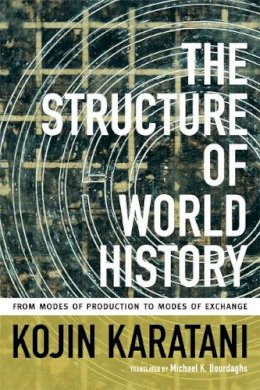9%OFF

Stock image for illustration purposes only - book cover, edition or condition may vary.
The Structure of World History: From Modes of Production to Modes of Exchange
Kojin Karatani
€ 38.99
€ 35.30
FREE Delivery in Ireland
Description for The Structure of World History: From Modes of Production to Modes of Exchange
Paperback. Seeks to understand both Capital-Nation-State, the interlocking system that is the dominant form of modern global society, and the possibilities for superseding it. Translator(s): Bourdaghs, Michael K. Num Pages: 376 pages, 6 tables, 1 figure. BIC Classification: JHBA; JPA; KCZ. Category: (G) General (US: Trade). Dimension: 153 x 224 x 20. Weight in Grams: 516.
In this major, paradigm-shifting work, Kojin Karatani systematically re-reads Marx's version of world history, shifting the focus of critique from modes of production to modes of exchange. Karatani seeks to understand both Capital-Nation-State, the interlocking system that is the dominant form of modern global society, and the possibilities for superseding it. In The Structure of World History, he traces different modes of exchange, including the pooling of resources that characterizes nomadic tribes, the gift exchange systems developed after the adoption of fixed-settlement agriculture, the exchange of obedience for protection that arises with the emergence of the state, the commodity exchanges that characterize capitalism, and, finally, a future mode of exchange based on the return of gift exchange, albeit modified for the contemporary moment. He argues that this final stage—marking the overcoming of capital, nation, and state—is best understood in light of Kant's writings on eternal peace. The Structure of World History is in many ways the capstone of Karatani's brilliant career, yet it also signals new directions in his thought.
Product Details
Publisher
Duke University Press
Format
Paperback
Publication date
2014
Condition
New
Weight
513g
Number of Pages
376
Place of Publication
North Carolina, United States
ISBN
9780822356769
SKU
V9780822356769
Shipping Time
Usually ships in 4 to 8 working days
Ref
99-2
About Kojin Karatani
Kōjin Karatani is an internationally renowned theorist and philosopher. Previously, he was a professor at Hosei University in Tokyo, Kinki University in Osaka, and Columbia University. Among the dozens of books that he has written in Japanese, four have been translated into English: History and Repetition; Transcritique: Kant and Marx; Architecture as Metaphor: Language, Number, Money; and Origins of Modern Japanese Literature, which is also published by Duke University Press.
Reviews for The Structure of World History: From Modes of Production to Modes of Exchange
“In place of a singular conception of development, Karatani envisions a truly world-historical perspective. Moreover, his unique approach to world history demonstrates the value of establishing a more constructive dialogue between philosophy, anthropology, sociology, economics and historical studies.”
Yamoi Pham
Journal of World Systems Theory
“The Structure of World History is a must-read for anybody who is interested in a universal master narrative being in search not only for power of resistance against this system but also for possible ways ‘to transcend the capitalist social formation from within’ (p. 291).”
Steffi Richter
H-Asia, H-Net Reviews
“Well argued, and with a highly approachable translation by Michael Bourdaghs, this work is both an excellent entry point for those unfamiliar with Karatani’s previous work, and an excellent continuation of the themes he has previously explored. By providing such an ambitious and innovative work, Karatani offers much to the fields of anthropology, sociology and historical study, as well as a starting point for theorists interested in the concept of mode D and the promises it contains.”
Wesley R. Bishop
Capital & Class
Yamoi Pham
Journal of World Systems Theory
“The Structure of World History is a must-read for anybody who is interested in a universal master narrative being in search not only for power of resistance against this system but also for possible ways ‘to transcend the capitalist social formation from within’ (p. 291).”
Steffi Richter
H-Asia, H-Net Reviews
“Well argued, and with a highly approachable translation by Michael Bourdaghs, this work is both an excellent entry point for those unfamiliar with Karatani’s previous work, and an excellent continuation of the themes he has previously explored. By providing such an ambitious and innovative work, Karatani offers much to the fields of anthropology, sociology and historical study, as well as a starting point for theorists interested in the concept of mode D and the promises it contains.”
Wesley R. Bishop
Capital & Class
